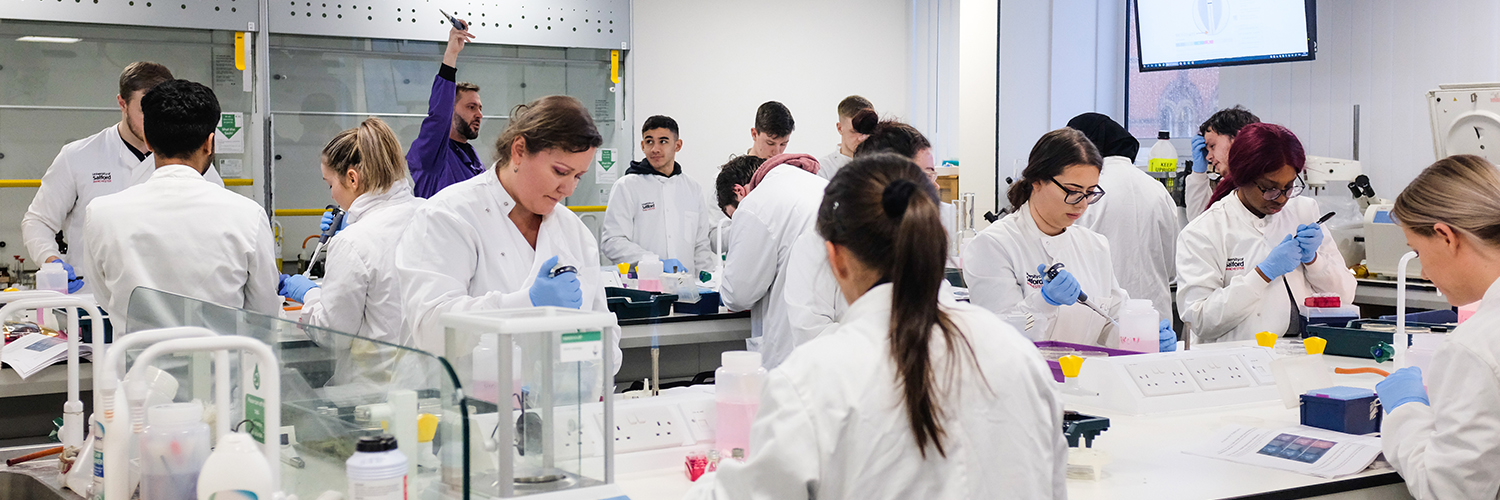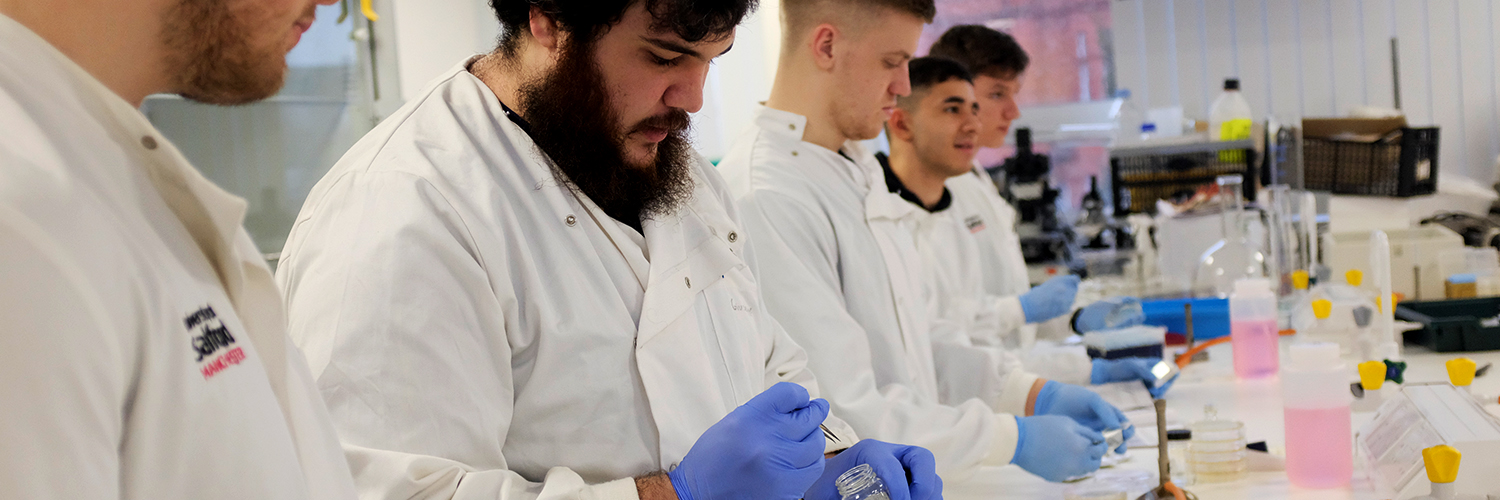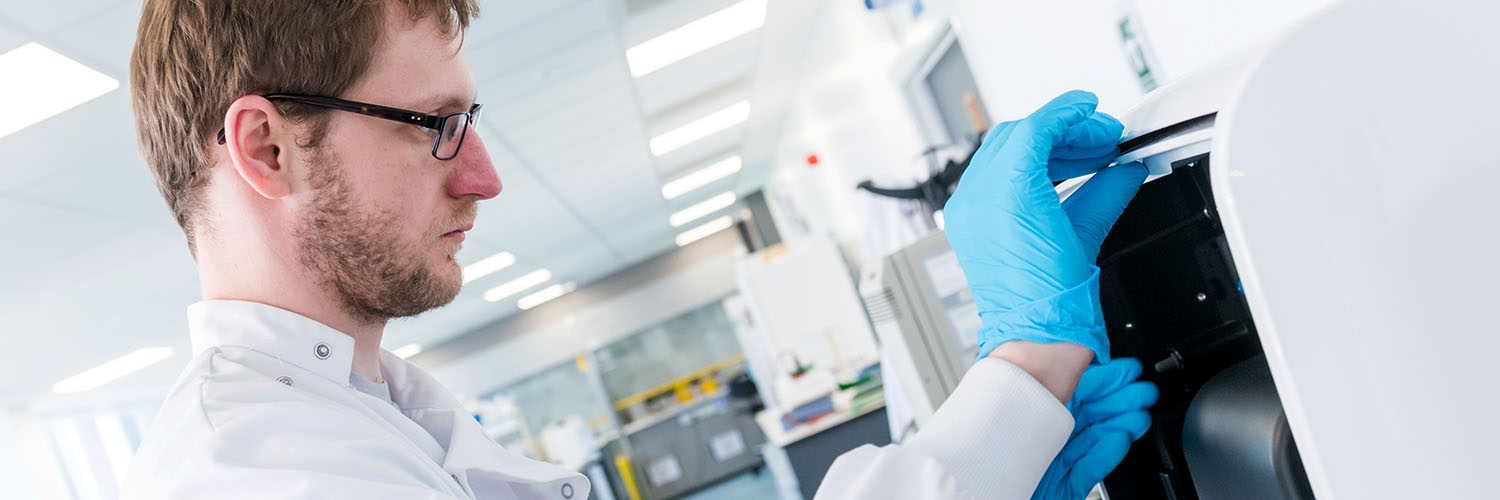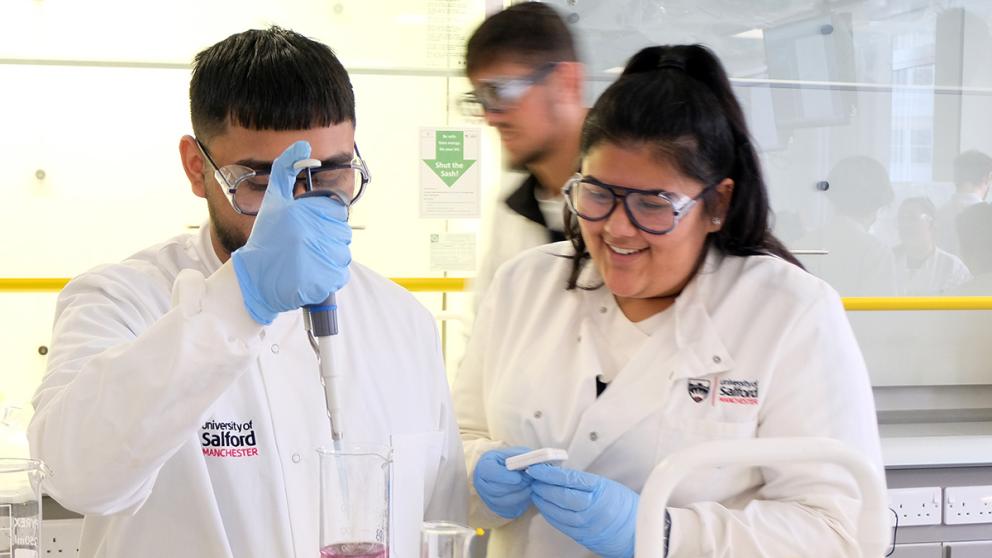
Pharmaceutical Science with Foundation Year
Full-time
Part-time
With placement
Four year
Eight year
Five year
September 2026
In a nutshell
Pharmaceutical science is at the cutting-edge of research and is an exceptionally versatile scientific discipline with opportunities in the field continuing to grow and develop.
This pathway is recommended if you want to develop your career in biosciences but have a non-scientific background, or you don’t meet the entry requirements for direct entry to an honours degree. This course may also appeal if you are returning to education or you wish to change career direction. If you successfully complete and pass the foundation year, you will automatically progress on to the full BSc (Hons) Pharmaceutical Science honours degree.
The COVID-19 pandemic has changed everything. At the University of Salford, we are training the next generation of pharmaceutical scientists to meet these challenges and apply scientific knowledge to design drugs that improve life quality and tackle pandemics and diseases.
Start your study journey
Register for our next Open Day to learn more about studying pharmaceutical science, explore our facilities and meet the course team
You will:
- Gain a broad, basic knowledge of chemical principles to prepare you for more advanced study
- Have the opportunity to gain real-world experience through a placement year
- Develop skills to meet the challenges created by the completion of the Human Genome Project
options available
Course accreditations
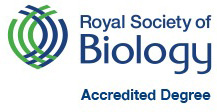
This is for you if...
Want an excellent route into science for those from a non-scientific background
You are returning to education or seeking to develop your career in a new direction
You didn't meet the entry requirements for BSc (Hons) Pharmaceutical Science
All about the course
Foundation year
This Foundation Year places a strong emphasis on Biology and Chemistry, providing the core scientific grounding needed for a wide range of human and natural science degrees.
The Foundation Year pathway is designed to increase your knowledge and understanding of human and natural sciences, necessary for understanding contemporary issues.
With an emphasis on both understanding and problem solving in addition to practical and communication skills, you will build knowledge across the breadth of the subject. You will also experience laboratory work, and develop your study skills.
If you successfully complete and pass your Foundation Year but you're still not sure this is the subject for you, we have an extensive suite of Human and Natural Sciences (HANS) subjects you can still progress to:
- Biological Science
- Human Biology and Infectious Diseases
- Marine Biology
- Geography
- Environmental Management
- Biomedical Science
- Biochemistry
- Zoology
- Wildlife Conservation
- Wildlife Conservation with Zoo Biology
BSc (Hons) degree
Course delivery
Aligned with industry best-practice, the BSc Pharmaceutical Science course is carefully-designed to balance academic study with the application of professional laboratory skills and competencies, mirroring the skills needed to succeed in the scientific community.
Across the three years you will build in-depth knowledge of genomics, drug discovery and pharmacology, while building your practical laboratory skills. In your final year, you will complete your degree with a supervised research project in a subject of your choice
Learn more about the core and optional course modules in the section below.
Learning experience
With a focus on practical learning, throughout the degree you will learn about cutting edge scientific knowledge and techniques. For example, medical breakthroughs have made it possible to identify the genes associated with many cancers and inherited disorders. In your second year of study you'll have the option to study a module focused on genomics to build an understanding of inter-relationship between genes and their influence on the human body and diseases.
Industry placement
On this course, you will have the option to take an industry placement year between years two and three of the BSc degree. Although you'll be responsible for securing your placement, a tutor will support you, monitor your progress and assess your final placement report.
If you successfully complete a placement year as part of your studies, your degree will attain 'Advanced Degree Accreditation' by the Royal Society of Biology.
Recent Pharmaceutical Science students have been offered placements at Pfizer in Kent, the Transplant Centre at Wythenshawe Hospital, and the Cancer Research UK Manchester institute.
Chemical Principles
This module will help you develop an understanding of the fundamentals of the periodic table, classification within chemistry, reaction processes and quantities, and the fundamentals of organic chemistry through lectures, laboratory workshops and independent study via an interactive learning platform.
Scientific Methods
This module will help you develop practical skills in the fields of biological, chemical and environmental science. It includes the use of glassware and instrumentation, developing data recording and analysis skills, and foundational laboratory-training. It also aims to train all students on how to write-up experimental work via an interactive learning platform, which includes pre- and post- laboratory training exercises.
Data Handling
Develop skills for the application of statistical and mathematical methods and practise using Information Technology for effective the presentation and communication of data and ideas.
Professional Communications
This module will provide students with a structured and supportive environment in which to develop their academic practice and professionalism. This will be achieved through a series of lectures and tutor-led seminars that will equip students with the skills required for successful study in Higher Education.
Biological Principles
Explore the characteristics of plant and animal cells which are the building blocks of all life forms; their interactions with micro and macro environments, and learn about the diversity of animal and plant life in a range of ecosystems.
Science for Health
Evaluate a range of environmental and scientific factors that interact to influence health – e.g. pollution, nutrition, drug development and consider examples of environmental interventions and clinical trials.
Genetics
Genetics has become a central topic not only in biological science, but also for topics such as data science, art and culture. Genetics is revolutionising all spheres of life at an unprecedented speed. It is central to all areas of biology, from cellular development and reproduction to conservation and biodiversity. In this core module, we will provide you with the framework of this diverse area, covering areas from DNA fingerprinting and DNA/RNA editing, to ethics and conservation biology. We will expose you to the latest research in the area of molecular genetics and provide the foundation for your future.
Introduction to Organic Chemistry
The aim of this module is to introduce organic chemistry through structure and mechanism. You will study organic reactions of key functional groups such as alkenes, carbonyl and aromatic compounds.
Introductory Biochemistry
The aim of this module is to introduce principles of biochemistry. You will study biochemical pathways and organelles, relevant to cell biology.
Cell Biology
This module provides a broad cell biology knowledge base, building a solid foundation of key scientific content relevant to subsequent modules within several bioscience degrees.
Biological Chemistry
This module will help you understand key concepts in biological chemistry, including spectroscopy and spectrometry techniques for identifying small organic molecules; chemical reactivity and molecular interactions; chromatography; and kinetics and thermodynamics.
Biochemical and Pharmaceutical Skills
This is a practical laboratory based module aiming to develop practical skills in the areas of biochemistry, pharmaceutical sciences and general chemistry. The students will be involved in hands-on laboratory work covering a range of essential techniques used in academia and industry. Students will be given feedback on their work during the classes.
Clinical and Molecular Genetics
Clinical and Molecular Genetics will enable students to gain practical skills in molecular biology and bioinformatics, through linked laboratory and computer sessions. The lecture programme is delivered by three academics, each an expert in their specific area of clinical and molecular genetics. Topics covered include, current molecular biology and bioinformatics techniques, the control of bacterial and eukaryotic gene expression and the effect of mutations on gene expression and how this can lead to human genetic diseases.
Chemical and Biochemical Research Skills
This module will help you develop your scientific writing and communication skills, and understand key statistical methods that may be applied to the chemical and biochemical sciences.
Drug Discovery and Medicinal Chemistry
This module will provide students with the opportunity to critically evaluate and understand advanced concepts in drug discovery, practical methodologies in drug synthesis, and to use a range of primary and secondary information sources.
Pharmacology
This module aims to introduce you to the general properties of pharmacologically active ingredients and their effect upon the major organ systems. You will develop an understanding of techniques applicable to research and industry in the field of pharmacology.
Human Physiology
Investigate the function of major organ systems and how they regulate homeostasis. Using cutting-edge lab equipment, you will develop practical skills to analyse physiological adaptations as true physiologists do in the world sport and exercise science.
Genomics and Proteomics
This module provides an appreciation of topics in biochemistry with an emphasis on genomics, proteomics, structural biology and their application in research and industry.
Applied Pharmacology
This module will enhance your understanding of pharmaceutical analysis and other aspects of drug development including pre-clinical and clinical trials.
Biochemistry of Drugs and Disease
This module will provide a contemporary overview of some important disease processes and associated drug intervention mechanisms.
Final Year Project and Professional Skills
This dissertation module allows you to develop independent research skills, including both data collection/generation (for example, via lab-based research or fieldwork) and analysis, while conducting research on a topic in an area relevant to your programme of study. You will also develop your professional skills, with a focus on employability.
Science and Industry
This module will help you develop the understanding of the fundamentals of sustainability and greenness and recovery from a post-pandemic landscape featuring skills sets of biochemistry, chemistry, biomedical, pharmaceutical and personal health care from the laboratory to gaining understanding of the workings of industry. The material issued as lecture notes and support guides will be all released pre-module and each lecture session will ‘flip-learning’ to ‘workshop’ through the academic staff and invited industry speakers for ‘real world’ experience
Choose one option from
Advances In Pathophysiology
This highly interactive optional final year module allows students to explore methods used in the diagnosis, monitoring and treatment of cardiovascular and respiratory (thoracic) diseases. Assessment of the module uses real case studies to enable students to develop both their analytical and critical narrative skills. Students will learn mechanisms of disease, how these relate to clinical outcomes, how patient care plans are developed, and the future approaches of thoracic medicine. Special features of the module include full CPET testing in the Health School human performance lab and the opportunity to visit to the North West Lung Centre to engage with clinical pulmonary testing.
Frontiers in Medicine Design
This module will introduce you to the latest technologies and techniques used in modern medicine design. A major component of the module will focus on computational techniques used in the drug development process and computer lab classes will provide you with the opportunity to use industry standard software. In addition, you will also learn about the latest developments in 'wet' laboratory techniques that are assisting in the development of treatments for conditions such as HIV and SARS-COV-2.
We take a flexible approach to our course delivery that promotes diversity and inclusivity and provides a blended learning experience, which will vary to meet specific programme requirements. This learning time includes formal lectures and interactive activities such as seminars, tutorials, practical sessions, laboratory and studio learning. Smaller classes may be used to support collaborative activities such as project and group work and presentations. A range of different assessments and feedback is offered to meet the needs of both our diverse student body and specific subject needs.
Our undergraduate courses are normally made up of 20 credit modules which are equal to 200 hours of learning time. A three-year degree qualification typically comprises a total of 360 credits (120 credits per year).
Please note that exact modules and content offered may vary in order to keep content current and, for courses that offer optional modules, may depend on the number of students selecting particular options. When accepting your offer of a place to study on a programme with optional modules, you should be aware that optional modules may not all run each year. Your tutor will be able to advise you as to the available options on or before the start of the programme. Whilst the University tries to ensure that you can undertake your preferred options, it cannot guarantee this.
Frequently asked questions
What is a foundation year?
A foundation year offers a year of studying to gain an understanding of the programme before progressing to the full three-year studies. You'll get the chance to understand the way higher education studying works and gain the relevant skills and knowledge needed to undertake the full degree.
What is Pharmaceutical Science?
Pharmaceutical science is a broad field that involves the discovery, development and manufacturing of drug products. Our pharmaceutical science programme allows you to explore, develop, and analyse the world of medicine to ensure patients are getting the right treatment. If you’re interested in studying chemistry and biology and want to make a positive impact on people’s lives, then studying a pharmaceutical degree is ideal for you.
Is pharmaceutical science a good career?
The major pharmaceuticals industry offers good opportunities for career advancement for those choose to who wish to advance in the field. You could also choose to enjoy a long career in the same position if that more aligned with your career goals.
Is Pharmaceutical science a good degree?
Yes, pharmaceutical science is generally considered a good degree choice, particularly if you have a passion for science and want to contribute to the development of new medicines and treatments. The pharmaceutical industry is a global growth sector, offering diverse career opportunities and future-proofing your skills.
Is a Pharmaceutical Science degree hard?
Studying our Pharmaceutical Science degree can be challenging yet offers many rewarding benefits. At the University of Salford, you will be at the cutting-edge of research and the projects you will undertake will be exciting and inspiring.
Despite the challenging and busy nature of our Pharmaceutical Science programme, it can also be very rewarding as you’ll be building your knowledge and making an impact in such an important field. By the end of your degree, you will have developed many key skills including teamwork, communication, numerical and data analysis and independent thinking.
There are methods to ensure you’re getting the best of your degree, including practicing good time management and making time for yourself to recharge. If you find your studies overwhelming, there will be support available from your lecturers and university support staff.
What can you do with a degree in Pharmaceutical Science?
Pursuing a pharmaceutical science degree can lead to various rewarding career paths in the pharmaceutical industry and research institutions. Below is a list of jobs you could pursue after graduating:
- Pharmaceutical technologist
- Research scientist
- Clinical research associate
- Medical, pharmaceutical and scientific writing
Our BSc (Hons) Pharmaceutical Science degree will provide you with specialist and transferable skills that are highly regarded by employers from different sectors, including Contract Research Organisations (CROs), and small and large pharmaceutical and biotechnology companies. The transferable skills you will develop can be applied in research, development, quality assurance, within the government, and assisting on legal cases.
Recent course graduates have secured roles working with the NHS in hospitals and laboratories, at research institutes working on clinical trials, and on graduate schemes with large pharmaceutical companies.
School of Science, Engineering and Environment
Rising to the challenge of a changing world, our degree courses are designed to shape the next generation of urbanists, scientists, engineers, consultants and leaders.
Driven by industry, and delivered by supportive programme teams, you can develop the knowledge and skills to become unstoppable in your career.
facilities
As a pharmaceutical science student, you will be based in our advanced, integrated teaching laboratory known as the Bodmer Lab. This specialist, purpose built facility ensures that you benefit from the latest technologies to keep teaching and learning apace with cutting-edge innovation and discovery.
Industry collaboration and research
When you start this degree with Salford, you are also joining a community making a difference in industry, our local region and in our wider society.
Many of our academics and technicians who support your course also deliver collaborative, interdisciplinary, high-impact work in a range of bioscience issues and challenges.
Discover how you are part of something bigger.
What about after uni?
Employment
This course will provide you with specialist and transferable skills which are highly regarded by employers from different sectors including Contract Research Organisations (CROs), small and large pharmaceutical and biotechnology companies. The transferable skills learnt will allow you to seek work in several areas such as research, development, quality assurance, within the government, and assisting on legal cases.
Pharmaceutical science is at the cutting-edge of research and is an exceptionally versatile scientific discipline with opportunities in the field continuing to grow and develop. This provides graduates of this course with some excellent prospective career paths and our programme will ensure that you are fully equipped to take advantage of them.
This degree is ideal if you are interested in a career in the biotechnology or pharmaceutical industries, as well as clinical or other biomedical areas such as analytical biochemistry. Some of our recent graduates have found employment in hospitals, CROs (working on clinical trials in the metabolism section) and large pharmaceutical companies.
Further Study
You might find you want to learn more about biosciences. Building on our scientific expertise, we offer a range of postgraduate courses that can take your interests and career opportunities further. Salford graduates and alumni also receive a generous fees discount.
Pharmaceutical science graduates can also choose to follow a research programme with our Biomedical Research Centre to further their knowledge in topics such as microbiology, parasitology, medicinal chemistry, cancer and cell biology. Learn more about postgraduate research opportunities available through our Doctoral School.
What you need to know
International applications
This course isn’t suitable for international students.
If you are an international student and interested in studying a foundation year, please visit our International Foundation Year course page.
Applicant profile
We are looking for applicants with a strong interest in how medicines work, are designed and manufactured. You should also interested in biological and chemical sciences.
English language requirement
All of our courses are taught and assessed in English. If English is not your first language, you must meet our minimum English language entry requirements. An IELTS score of 6.0 (no element below 5.5) is proof of this, and we also accept a range of equivalent qualifications.
Read more about our English language requirements, including information about pathways that can help you gain entry on to our degree courses.
UCAS tariff points
64 UCAS points.
A level
64 UCAS Tariff points. At least one full A level is required.
BTEC Level 3 National Extended Diploma
MPP
T Level
Pass (D or E on the core) - Science only accepted subject. Must have passed all components.
Access to HE
64 UCAS Tariff points from a QAA Approved Level 3 Access to HE Diploma.
GCSE
In addition to Level 3 requirements, you must have evidence of Level 2 GCSE English and Maths at Grade C/4 or above.
Scottish Highers
64 UCAS Tariff points from Higher Level.
Irish Leaving Certificate
64 UCAS Tariff points from Higher Level.
International Baccalaureate
26 points.
Salford Alternative Entry Scheme (SAES)
We welcome applications from students who may not meet the stated entry criteria but who can demonstrate their ability to pursue the course successfully. Once we have received your application we will assess it and recommend it for SAES if you are an eligible candidate.
There are two different routes through the Salford Alternative Entry Scheme and applicants will be directed to the one appropriate for their course. Assessment will either be through a review of prior learning or through a formal test.
How much?
| Type of study | Year | Fees |
|---|---|---|
| Full-time home | 2026/27 | £8,505 for Foundation Year and £9,535 for subsequent years. |
| Part-time | 2026/27 | Part time fees will be calculated on a pro rata basis |
The government has recently announced that university tuition fees for home students in England will increase every year in line with inflation from 2026 onwards. We are awaiting further guidance on how this will be calculated, and will update here and on our fees webpage as soon as details are announced, as well as communicate with any existing offer holders for September 2026.
Additional costs
All field trips are funded by the school but you may need to consider additional costs such as food and spending money.
International field trips that are part of core modules are also funded by the school but you will need to pay towards international field trips that are part of optional modules (although these are subsidised by the school) and you will be made aware of these costs before selecting the module.
You should also consider further costs which may include books, stationery, printing, binding and general subsistence on trips and visits.
All set? Let's apply
Enrolment dates
Student information
Terms and conditionsUCAS information
Course ID F155
Institution S03

